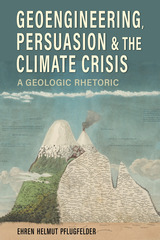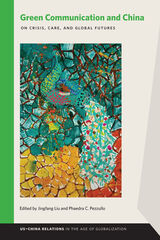Results by Title
4 books about Communication in the environmental sciences
4 books about Communication in the environmental sciences

Geoengineering, Persuasion, and the Climate Crisis
A Geologic Rhetoric
Ehren Helmut Pflugfelder
University of Alabama Press, 2023
A rhetorical exploration of an underexamined side of climate change—the ongoing research into and development of geoengineering strategies
Geoengineering, Persuasion, and the Climate Crisis: A Geologic Rhetoric exposes the deeply worrying state of discourse over geoengineering—the intentional manipulation of the earth’s climate as means to halt or reverse global warming. These climate-altering projects, which range from cloud-whitening to carbon dioxide removal and from stratospheric aerosol injection to enhanced weathering, are all technological solutions to more complex geosocial problems.
Geoengineering represents one of the most alarming forms of deliberative discourse in the twenty-first century. Yet geoengineering could easily generate as much harm as the environmental traumas it seeks to cure. Complicating these deliberations is the scarcity of public discussion. Most deliberations transpire within policy groups, behind the closed doors of climate-oriented startups, between subject-matter experts at scientific conferences, or in the disciplinary jargon of research journals. Further, much of this conversation occurs primarily in the West.
Ehren Helmut Pflugfelder makes clear how the deliberative rhetorical strategies coming from geoengineering advocates have been largely deceptive, hegemonic, deterministic, and exploitative. In this volume, he investigates how geoengineering proponents marshal geologic actors into their arguments—and how current discourse could lead to a greater exploitation of the earth in the future.
Pflugfelder’s goal is to understand the structure, content, purpose, and effect of these discourses, raise the alarm about their deliberative directions, and help us rethink our approach to the climate. In highlighting both the inherent problems of the discourses and the ways geologic rhetoric can be made productive, he attempts to give “the geologic” a place at the table to better understand the roles that all earth systems continue to play in our lives, now and for years to come.
Geoengineering, Persuasion, and the Climate Crisis: A Geologic Rhetoric exposes the deeply worrying state of discourse over geoengineering—the intentional manipulation of the earth’s climate as means to halt or reverse global warming. These climate-altering projects, which range from cloud-whitening to carbon dioxide removal and from stratospheric aerosol injection to enhanced weathering, are all technological solutions to more complex geosocial problems.
Geoengineering represents one of the most alarming forms of deliberative discourse in the twenty-first century. Yet geoengineering could easily generate as much harm as the environmental traumas it seeks to cure. Complicating these deliberations is the scarcity of public discussion. Most deliberations transpire within policy groups, behind the closed doors of climate-oriented startups, between subject-matter experts at scientific conferences, or in the disciplinary jargon of research journals. Further, much of this conversation occurs primarily in the West.
Ehren Helmut Pflugfelder makes clear how the deliberative rhetorical strategies coming from geoengineering advocates have been largely deceptive, hegemonic, deterministic, and exploitative. In this volume, he investigates how geoengineering proponents marshal geologic actors into their arguments—and how current discourse could lead to a greater exploitation of the earth in the future.
Pflugfelder’s goal is to understand the structure, content, purpose, and effect of these discourses, raise the alarm about their deliberative directions, and help us rethink our approach to the climate. In highlighting both the inherent problems of the discourses and the ways geologic rhetoric can be made productive, he attempts to give “the geologic” a place at the table to better understand the roles that all earth systems continue to play in our lives, now and for years to come.
[more]

Green Communication and China
On Crisis, Care, and Global Futures
Jingfang Liu
Michigan State University Press, 2020
How does China speak for nature? How are the pollution and climate change crises being addressed? What are the possibilities and limitations of mobilizing publics to care about the environment through new media, tourism, and government policy? Green Communication and China is the first volume to identify the importance of studying environmental communication in, about, and with China, a rising global environmental leader whose ecological and political controversies often make international headlines. Organized into three sections on communicating crisis, communicating care, and environmental futurity, these essays span multimodal communication practices and methods in green public culture and address topics ranging from The North Face advertisements to NGO advocacy to global governmental policy. The volume showcases the work of leading scholars, all of them deeply intimate with China, in disciplines ranging from cultural studies and rhetoric to public opinion polling, discourse analysis, ethnic studies, and sociology. These complex projects engage transnational and national politics, ecological and economic challenges, media saturation, and government control. Holding these tensions together without glossing over differences, Green Communication and China will inform new agendas for environmental communication in China, the United States, and beyond.
[more]

Local Climate Action Planning
Michael Boswell, Adrienne Greve, and Tammy L. Seale
Island Press, 2011
Climate change is a global problem, but the problem begins locally. Cities consume 75% of the world's energy and emit 80% of the world's greenhouse gases. Changing the way we build and operate our cities can have major effects on greenhouse gas emissions. Fortunately, communities across the U.S. are responding to the climate change problem by making plans that assess their contribution to greenhouse gas emissions and specify actions they will take to reduce these emissions.
This is the first book designed to help planners, municipal staff and officials, citizens and others working at local levels to develop Climate Action Plans. CAPs are strategic plans that establish policies and programs for mitigating a community's greenhouse gas (GHGs) emissions. They typically focus on transportation, energy use, and solid waste, and often differentiate between community-wide actions and municipal agency actions. CAPs are usually based on GHG emissions inventories, which indentify the sources of emissions from the community and quantify the amounts. Additionally, many CAPs include a section addressing adaptation-how the community will respond to the impacts of climate change on the community, such as increased flooding, extended drought, or sea level rise.
With examples drawn from actual plans, Local Climate Action Planning guides preparers of CAPs through the entire plan development process, identifying the key considerations and choices that must be made in order to assure that a plan is both workable and effective.
This is the first book designed to help planners, municipal staff and officials, citizens and others working at local levels to develop Climate Action Plans. CAPs are strategic plans that establish policies and programs for mitigating a community's greenhouse gas (GHGs) emissions. They typically focus on transportation, energy use, and solid waste, and often differentiate between community-wide actions and municipal agency actions. CAPs are usually based on GHG emissions inventories, which indentify the sources of emissions from the community and quantify the amounts. Additionally, many CAPs include a section addressing adaptation-how the community will respond to the impacts of climate change on the community, such as increased flooding, extended drought, or sea level rise.
With examples drawn from actual plans, Local Climate Action Planning guides preparers of CAPs through the entire plan development process, identifying the key considerations and choices that must be made in order to assure that a plan is both workable and effective.
[more]

Search For A Common Language
Environmental Writing And Education
edited by Melody Graulich & Paul Crumbley
Utah State University Press, 2005
A stellar group of writers, scientists, and educators illuminate the intersections between environmental science, creative writing, and education, considering ways to strengthen communication between differing fields with common interests. The contributing authors include Ken Brewer, Dan Flores, Hartmut Grassl, Carolyn Tanner Irish, Ted Kerasote, William Kittredge, Ellen Meloy, Louis Owens, Jennifer Price, Robert Michael Pyle, Kent C. Ryden, Annick Smith, Craig B. Stanford, Susan J. Tweit, and Keith Wilson.
[more]
READERS
Browse our collection.
PUBLISHERS
See BiblioVault's publisher services.
STUDENT SERVICES
Files for college accessibility offices.
UChicago Accessibility Resources
home | accessibility | search | about | contact us
BiblioVault ® 2001 - 2024
The University of Chicago Press









